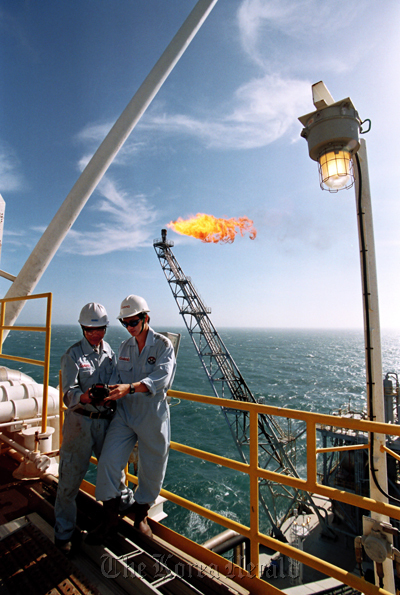Inconsistent energy policies give out mixed signals
Experts call for long-term strategies on overseas energy development
By Korea HeraldPublished : Nov. 24, 2014 - 21:12
As a country lacking in natural resources, energy security has been always one of the top agendas of every government in Korea. The problem is the lack of consistency in the nation’s energy policy that changes every five years when a new president is elected.
For instance, the previous Lee Myung-bak administration had pushed the state-run energy enterprises to strike overseas energy deals ― most of them involving drilling for oil and other energy sources ― during its term between 2008 and early 2013. The government at the time went so far as to set an annual deal target for each energy developer.
However, after President Park Geun-hye took office, the policy focus shifted to the financial health of these state-run companies, forcing them to lower their debts by selling the overseas assets they were previously urged to acquire.
During the October parliamentary audit sessions, state-run energy firms including Korea National Oil Corp., Korea Gas Corp. and Korea Resources Corp. came under fire when lawmakers exposed “dubious” overseas energy deals signed during the Lee administration.
“It is true that there were some irrational deals driven by the previous government, but it is wrong to treat all projects as a waste of money,’’ a high-ranking official from a state-run energy developer said on the condition of anonymity.
For instance, the previous Lee Myung-bak administration had pushed the state-run energy enterprises to strike overseas energy deals ― most of them involving drilling for oil and other energy sources ― during its term between 2008 and early 2013. The government at the time went so far as to set an annual deal target for each energy developer.
However, after President Park Geun-hye took office, the policy focus shifted to the financial health of these state-run companies, forcing them to lower their debts by selling the overseas assets they were previously urged to acquire.
During the October parliamentary audit sessions, state-run energy firms including Korea National Oil Corp., Korea Gas Corp. and Korea Resources Corp. came under fire when lawmakers exposed “dubious” overseas energy deals signed during the Lee administration.
“It is true that there were some irrational deals driven by the previous government, but it is wrong to treat all projects as a waste of money,’’ a high-ranking official from a state-run energy developer said on the condition of anonymity.

“We need a strategic and consistent approach toward resource development given that oil and gas exploration is a high-risk and high-return business by nature and takes a decade on average to evaluate the success of a drilling.’’
As a case in point, KNOC discovered additional oil reserves in its Hawler oil field in Iraq’s northern Kurdish region in March this year. It was the fourth oil discovery in the same oil shell.
The Hawler project, however, had been criticized as an unprofitable investment decision back in 2008 when the KNOC secured a 15-percent stake in the oil field.
A growing number of energy experts are now worried about the “opposite” rush of state-energy firms to sell their overseas energy assets, pushed by the current government.
According to data compiled by Democratic United Party lawmaker Baek Jae-hyun, six state-run energy companies are planning to dispose of overseas assets worth a combined 6.3 trillion won ($5.96 billion) by 2017. KNOC tops with a plan to sell 2.7 trillion won ($2.57 billion) worth of assets, followed by Korea Electric Power Corp. which submitted a 1.43 trillion won worth overseas energy asset disposal plan.
Against this backdrop, experts have raised concerns that the nation’s inconsistent energy security policy could leave Korea behind in the global competition for energy asset acquisitions.
The KNOC data showed that both China and Japan have beefed up their strategies to take over attractive energy assets over the past two years. On the contrary, Korea was conspicuous by its absence in the global bids for energy assets.
China has now become the world’s third largest investor in the world after the U.S. and Japan following its multibillion dollar energy asset deals overseas.
“With the oil prices falling, the value of energy assets tends to depreciate, which means it is a good time to hunt for overseas energy development projects,’’ a KNOC official said.
Last month, Goldman Sachs, a leading U.S. investment bank, forecast the oil prices to go as low as $75 per barrel by the first quarter of 2015, the lowest level in three years.
By Seo Jee-yeon (jyseo@heraldcorp.com)
-
Articles by Korea Herald




![[Herald Interview] 'Amid aging population, Korea to invite more young professionals from overseas'](http://res.heraldm.com/phpwas/restmb_idxmake.php?idx=644&simg=/content/image/2024/04/24/20240424050844_0.jpg&u=20240424200058)












![[KH Explains] Korean shipbuilding stocks rally: Real growth or bubble?](http://res.heraldm.com/phpwas/restmb_idxmake.php?idx=652&simg=/content/image/2024/04/25/20240425050656_0.jpg&u=)

